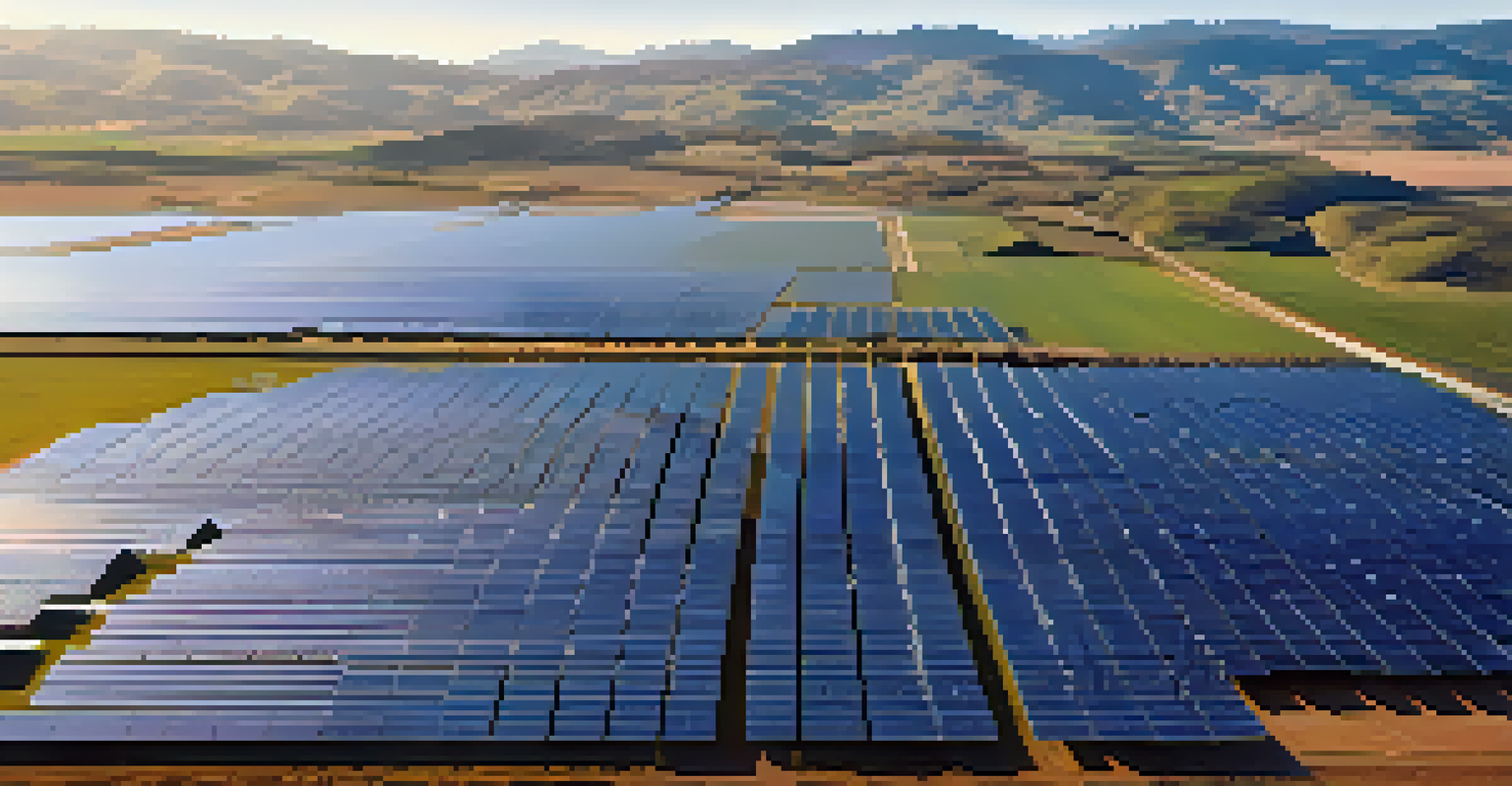The Benefits of Solar Energy for Environmental Health

Understanding Solar Energy and Its Role
Solar energy is derived from the sun's rays and can be harnessed using technology like solar panels. This renewable resource is crucial as it offers a sustainable alternative to fossil fuels, which are known for their environmental degradation. By understanding solar energy, we can appreciate its potential to power our homes and communities without harming the planet.
The use of solar energy is not a choice; it is a necessity for the future of our planet.
Unlike traditional energy sources that emit harmful greenhouse gases, solar energy is clean and abundant. This means that utilizing solar power can significantly reduce our carbon footprint, leading to a healthier environment. Imagine replacing the black smoke of coal plants with the clean, bright energy of the sun—what a refreshing change!
As we continue to face climate change and its associated challenges, the importance of solar energy becomes even clearer. It not only provides us with power but also supports a shift toward a more sustainable future. In the next sections, we will explore specific benefits of solar energy for the environment.
Reducing Air Pollution through Solar Energy
One of the most significant environmental benefits of solar energy is its ability to reduce air pollution. Traditional energy sources like coal and natural gas release harmful pollutants into the atmosphere, which can lead to respiratory issues and other health problems. By switching to solar, we can help clean the air we breathe.

When solar panels generate electricity, they do so without emitting harmful gases. This clean energy source ensures that we are not contributing to air quality deterioration. Picture a city where the air is fresh and clean, with vibrant blue skies—this is the reality solar energy can help create.
Solar Energy Reduces Pollution
Switching to solar energy significantly decreases air pollution, leading to cleaner air and healthier ecosystems.
Moreover, reducing air pollution is not just about health; it also supports biodiversity. Cleaner air means healthier ecosystems, allowing plants and animals to thrive. In essence, by embracing solar energy, we are fostering a healthier planet for all living beings.
Mitigating Climate Change with Solar Power
Climate change is one of the most pressing issues of our time, and solar energy plays a pivotal role in combating it. By replacing fossil fuels with solar power, we can significantly decrease the amount of carbon dioxide and other greenhouse gases released into the atmosphere. This shift is essential for curbing global warming.
We do not inherit the earth from our ancestors; we borrow it from our children.
Imagine the impact if millions of homes and businesses switched to solar energy—this collective action could lead to a drastic reduction in emissions. Every solar panel installed is a step toward a cooler, more stable climate. It's like planting a tree that will bear fruit for generations to come.
In addition to lowering emissions, solar energy encourages more sustainable practices. As we harness the sun's power, we inspire others to consider renewable options, creating a ripple effect in the fight against climate change. Together, we can make a difference!
Conserving Water Resources with Solar Energy
Water scarcity is a growing concern worldwide, and surprisingly, traditional energy production consumes vast amounts of water. From cooling coal plants to extracting oil, these processes require significant water resources, which can strain local supplies. Solar energy, on the other hand, uses minimal water in its production.
By shifting to solar power, we can conserve valuable water resources for drinking, agriculture, and other essential uses. It's like replacing a leaky faucet with a steady stream—every drop counts! This conservation is particularly crucial in arid regions where water is already limited.
Solar Power Mitigates Climate Change
Utilizing solar energy instead of fossil fuels can drastically lower greenhouse gas emissions and combat global warming.
Additionally, reducing water usage in energy production helps maintain local ecosystems. Healthy water systems support diverse wildlife and vegetation, contributing to overall environmental health. Embracing solar energy means not only protecting our water but also nurturing the planet's ecosystems.
Enhancing Energy Independence and Security
Solar energy contributes to energy independence by reducing reliance on imported fuels. When communities harness solar power, they are less vulnerable to fluctuations in energy prices and supply disruptions. This independence is like having your own garden—you're no longer at the mercy of the grocery store.
By investing in local solar energy projects, communities can create jobs and stimulate their economies, further supporting energy security. Imagine a future where energy is generated locally, providing jobs and stability while boosting local economies. That’s the promise of solar energy.
Moreover, energy independence enhances national security. By reducing our dependence on foreign oil, we can mitigate geopolitical tensions and foster a more stable global environment. In essence, solar energy not only empowers individuals but also fortifies nations.
Supporting Sustainable Development Goals
Solar energy aligns perfectly with the United Nations' Sustainable Development Goals (SDGs). These goals aim to address global challenges such as poverty, inequality, and environmental degradation. By adopting solar energy, we contribute to these critical initiatives, promoting a sustainable future for all.
For instance, solar power can help provide electricity to remote communities, improving access to education and healthcare. Imagine a school in a rural area powered by solar energy, enabling students to study at night or access online resources. That’s the transformative power of solar energy!
Solar Supports Sustainable Development
Adopting solar energy contributes to the UN's Sustainable Development Goals by improving access to essential services and fostering economic growth.
Furthermore, harnessing solar energy can stimulate innovation and technological advancements. As we explore new methods to capture and use solar power, we drive economic growth and create job opportunities. By supporting solar energy, we are investing in a brighter, more equitable future.
Encouraging Public Awareness and Action
As more people learn about the benefits of solar energy, public awareness grows, leading to increased action. Communities are more likely to invest in solar projects, advocate for renewable energy policies, and adopt sustainable practices. This collective movement is akin to a wave—once it starts, it gains momentum.
Educational initiatives and outreach programs can empower individuals to make informed decisions about their energy sources. Imagine a community coming together to discuss solar energy options, sharing knowledge and resources to make informed choices. This shared understanding fosters a culture of sustainability.

Moreover, as public demand for solar energy rises, governments and businesses are encouraged to invest in renewable technologies. This creates a positive feedback loop, where increased investment leads to more innovation and accessibility in solar energy solutions. Together, we can drive change!
The Future of Solar Energy for a Healthier Planet
Looking ahead, the future of solar energy appears bright, with advancements in technology making it more efficient and affordable. As solar panels become more accessible, more households and businesses are likely to adopt this clean energy source. This shift will continue to transform our energy landscape, paving the way for a healthier planet.
Moreover, ongoing research and development are leading to innovative solutions, such as solar storage systems that allow energy to be used even when the sun isn't shining. Imagine a world where every home is a mini power plant, generating and storing clean energy for its own use. That future is within reach!
Solar Energy Reduces Pollution
By switching to solar power, we can significantly lower air pollution and improve public health.
Ultimately, embracing solar energy is a choice for a healthier environment and a sustainable future. By making this transition, we are not only benefiting ourselves but also the generations to come. Let's harness the sun's power and work together for a better world.